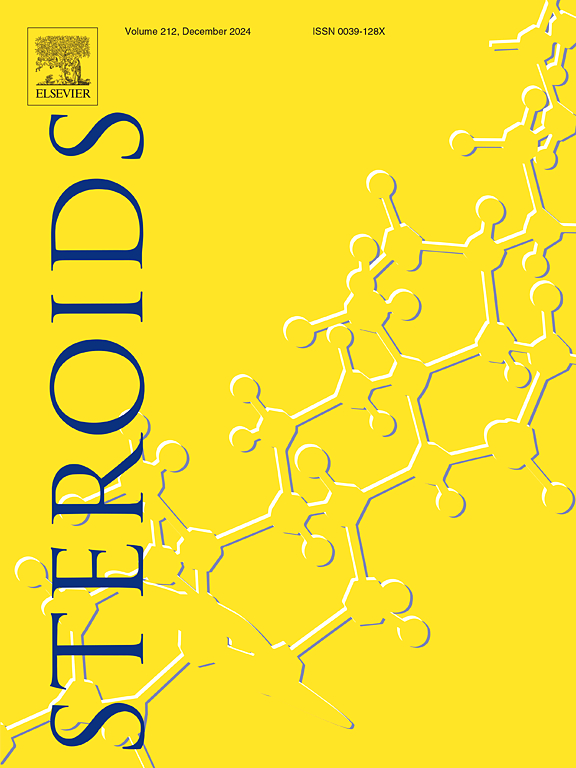Mendelian randomization studies of testosterone exposure: A systematic review
IF 2.1
4区 医学
Q4 BIOCHEMISTRY & MOLECULAR BIOLOGY
引用次数: 0
Abstract
Background
Testosterone impacts reproductive health, cardiovascular function, and metabolism. Considering the use of testosterone therapy and anabolic steroid misuse, understanding its health effects is important. While randomized clinical trials provide short-term insights, and observational studies struggle with confounding factors, Mendelian randomization offers an alternative by using genetic variations to explore causal relationships.
Method
A systematic search was performed using MEDLINE to identify studies published from inception to October 2024. We included studies that conducted a Mendelian randomization analysis to evaluate associations between testosterone exposure and any health outcomes in males.
Results
Twenty-nine Mendelian randomization studies were included, examining a broad spectrum of health outcomes linked to testosterone exposure. Cardiovascular and metabolic health, alongside prostate cancer risk, were the most frequently studied areas. Most studies indicated that higher testosterone levels were associated with adverse cardiovascular outcomes, such as increased risks of thromboembolism, ischemic heart disease, and heart failure. Elevated levels of genetically predicted free testosterone consistently showed a correlation with increased prostate cancer risk. The relationship between testosterone and type 2 diabetes remained inconclusive. Neuropsychiatric and musculoskeletal outcomes received less attention, while dermatological, infectious, and respiratory health were minimally explored.
Conclusion
This review provides information about the causal relationships between testosterone exposure and health outcomes, contributing to the ongoing discourse on testosterone-related health risks and benefits. The included studies exhibit great heterogeneity.
睾酮暴露的孟德尔随机化研究:系统回顾
睾酮影响生殖健康、心血管功能和新陈代谢。考虑到使用睾酮治疗和合成代谢类固醇滥用,了解其对健康的影响是重要的。虽然随机临床试验提供了短期的见解,观察性研究与混杂因素作斗争,但孟德尔随机化通过使用遗传变异来探索因果关系提供了另一种选择。方法采用MEDLINE系统检索自成立至2024年10月发表的研究。我们纳入了进行孟德尔随机分析的研究,以评估男性睾酮暴露与任何健康结果之间的关系。结果纳入了29项孟德尔随机化研究,研究了与睾酮暴露有关的广泛的健康结果。心血管和代谢健康以及前列腺癌风险是最常被研究的领域。大多数研究表明,较高的睾酮水平与不良心血管结果相关,如血栓栓塞、缺血性心脏病和心力衰竭的风险增加。基因预测的游离睾酮水平升高始终显示出与前列腺癌风险增加相关。睾酮和2型糖尿病之间的关系尚无定论。神经精神病学和肌肉骨骼的结果得到的关注较少,而皮肤病学、传染病和呼吸系统健康的研究则很少。结论:本综述提供了睾酮暴露与健康结果之间因果关系的信息,有助于对睾酮相关健康风险和益处的持续讨论。纳入的研究显示出很大的异质性。
本文章由计算机程序翻译,如有差异,请以英文原文为准。
求助全文
约1分钟内获得全文
求助全文
来源期刊

Steroids
医学-内分泌学与代谢
CiteScore
5.10
自引率
3.70%
发文量
120
审稿时长
73 days
期刊介绍:
STEROIDS is an international research journal devoted to studies on all chemical and biological aspects of steroidal moieties. The journal focuses on both experimental and theoretical studies on the biology, chemistry, biosynthesis, metabolism, molecular biology, physiology and pharmacology of steroids and other molecules that target or regulate steroid receptors. Manuscripts presenting clinical research related to steroids, steroid drug development, comparative endocrinology of steroid hormones, investigations on the mechanism of steroid action and steroid chemistry are all appropriate for submission for peer review. STEROIDS publishes both original research and timely reviews. For details concerning the preparation of manuscripts see Instructions to Authors, which is published in each issue of the journal.
 求助内容:
求助内容: 应助结果提醒方式:
应助结果提醒方式:


